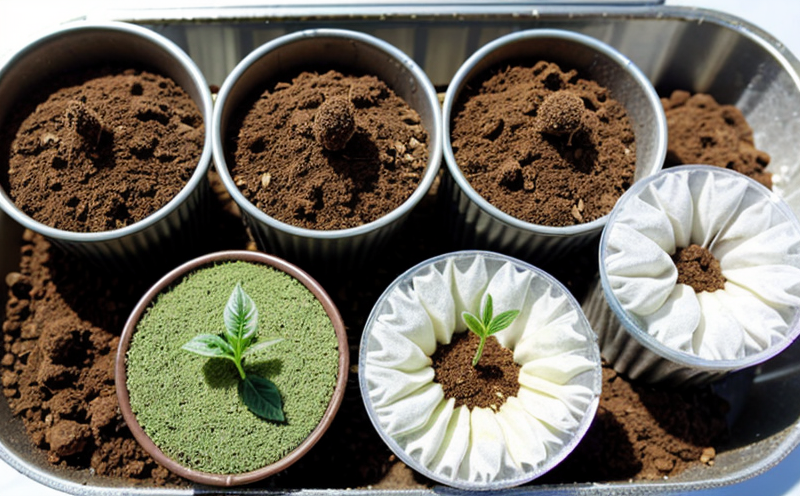Seed Density Testing
Seed density testing is a critical aspect of ensuring high-quality seeds that are capable of germination and growth. This process involves measuring the mass per unit volume of seeds, which helps in identifying potential issues such as contamination or genetic modifications. Accurate seed density measurements play a pivotal role in determining seed quality, which directly impacts crop yields and overall agricultural productivity.
Seed density testing is particularly important for ensuring that seeds meet regulatory standards set by various bodies like the International Seed Testing Association (ISTA). These standards are designed to protect consumers and ensure that only high-quality seeds reach farmers. The test helps in identifying seeds with lower or higher than expected densities, which can indicate poor storage conditions, contamination, or genetically modified traits.
The process typically involves several steps. First, a representative sample of the seed batch is taken for testing. This sample must be large enough to provide statistically significant results but small enough to manage in the laboratory setting. Once collected, the seeds are cleaned and dried according to specific protocols to ensure consistent moisture content.
The next step involves determining the mass of a known volume of seeds using precision scales or other appropriate instruments. This process is repeated multiple times for accuracy. After obtaining these measurements, statistical analysis is performed to calculate the average seed density. Compliance with international standards such as ISO 3696 ensures consistency and reliability in results.
Understanding the importance of seed density testing extends beyond just laboratory settings; it has real-world implications for farmers and consumers alike. In terms of customer impact, accurate testing can lead to better crop yields and healthier plants, ultimately benefiting both producers and end-users. Compliance with international standards ensures that seeds meet quality expectations globally.
The environmental and sustainability contributions of this service are significant as well. By ensuring seed quality through density testing, we contribute to sustainable agricultural practices by minimizing the use of resources and reducing waste. This not only helps in protecting natural ecosystems but also supports long-term food security.
Customer Impact and Satisfaction
Clients who rely on our seed density testing services benefit from a range of positive impacts that extend beyond mere compliance. By ensuring the highest quality seeds, we contribute to increased crop yields and healthier plants. This translates into better harvests for farmers, leading to improved livelihoods and economic stability in agricultural communities.
The precision and reliability of our tests enhance customer satisfaction by delivering accurate results within specified tolerances. Our services are tailored to meet the specific needs of various stakeholders, including quality managers, compliance officers, R&D engineers, and procurement teams. These professionals can trust that they receive data that is not only compliant with international standards but also reflective of the true condition of the seed batch.
We prioritize transparency in our reporting process, ensuring that all relevant information about the testing procedure and results are clearly communicated to clients. This approach fosters a culture of trust and reliability, which is essential for maintaining long-term business relationships. By adhering strictly to international standards such as ISO 3696, we ensure consistency across different regions and markets.
International Acceptance and Recognition
The seed density testing service is widely recognized internationally for its role in maintaining high-quality agricultural products. Compliance with international standards like ISO 3696 is crucial as it ensures that the results are consistent, accurate, and reliable across different regions. This recognition extends to various countries where these standards are adopted or referenced.
Our testing service aligns with global best practices in agriculture, contributing to the overall quality assurance framework for seeds. By adhering to such stringent standards, we ensure that our clients can confidently export their products to international markets without encountering regulatory barriers. This not only opens up new opportunities but also strengthens market positions by building trust among buyers.
The widespread adoption of ISO 3696 and similar standards reflects the global commitment to enhancing seed quality through standardized testing methods. The recognition received from these organizations underscores our commitment to excellence in agricultural testing services, making us a preferred choice for clients seeking reliable and accurate results.
Environmental and Sustainability Contributions
- Eco-friendly Practices: Our seed density testing process promotes eco-friendly practices by ensuring that only high-quality seeds reach farmers. This reduces the need for additional resources such as water, fertilizers, and pesticides, thereby minimizing environmental impact.
- Resource Efficiency: By identifying seeds with optimal densities, we encourage efficient use of agricultural resources, contributing to sustainable farming practices.
- Reducing Waste: Accurate testing helps prevent the distribution of substandard seeds, thereby reducing waste and supporting more effective resource allocation.





